Day On Merton - Thursday, March 31, 2011
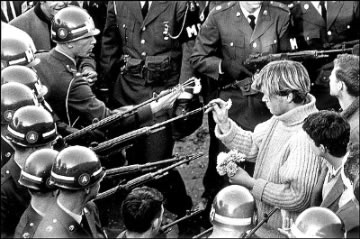
“It takes a man of heroic stature
to be a pacifist.”-- Dorothy Day
“At the root of all war is fear.”
— Thomas Merton This web page highlights quotes from four persons in the 20th century who I deeply admire, Dorothy Day, Thomas Merton, Martin Luther King Jr. and Mahatma Gandhi. Seldom do I get a chance to present an article written on one of them by another.
Here is an article by Dorothy Day on the death of Thomas Merton. This article was sent to me by Jim Forest a friend who has written biographies of both. Jim’s new revised and expanded biography of Dorothy Day, “All is Grace,” is coming out tomorrow. This article will soon be on the Dorothy Day online library
The Catholic Worker / December, 1968 / ID Number: 901
Thomas Merton, Trappist 1915–1968
By Dorothy Day
A year ago Thomas Merton was sending out his Advent-Christmas letter and telling of the death of three close friends by heart attacks. “Both were about my age,” he wrote. “So if I suddenly follow their example I will be the last one to be surprised.” He was fifty-three years old when he died. On Wednesday, December 11, we received a telegram from the abbot, telling of his death. We had no details of his dying from the New York Times that morning, because we had an early edition which ran only his prepared obituary. It was from a later issue of the paper that we learned the details. I felt certain that it was indeed a heart attack which had caused him to fall against a standing electric fan in the monastery in Bangkok, which in turn fell upon him, burning him severely. He had arrived in Bangkok a week before to attend a meeting of Roman Catholic monks who had gathered to discuss monasticism in the Far East.
Today friends from Holland send me a long list of quotes about conscience. Here are just a few of them:
“Every gun that is made, every warship launched, every rocket fired signifies, in the final sense, a theft from those who hunger and are not fed, those who are cold and not clothed. This world in arms is not spending money alone. It is spending the sweat of its laborers, the genius of its scientists, and the hopes of its children. This is not a way of life at all in any true sense. Under the cloud of threatening war, it is humanity hanging from a cross of iron.”-- Dwight D. Eisenhower
“War will exist until that distant day when the conscientious objector enjoys the same reputation and prestige that the warrior does today.”— John F. Kennedy
“He who joyfully marches to music in rank and file has already earned my contempt. He has been given a large brain by mistake, since for him the spinal cord would fully suffice … Heroism at command, senseless brutality, deplorable love-of- country stance - how violently I hate all this; how despicable and ignoble war is…I would rather be torn to shreds than be part of so base an action. It is my conviction that killing under the cloak of war is nothing but an act of murder.”—Albert Einstein
Today after our hour of prayer at Marquette University Library lobby some of us came here to enjoy a dinner of homemade soup, break and fruit. As we were talking, someone challenged us to why we are doing these prayer vigils to end the war in Afghanistan and to end Marquette’s support and participation in the war. My friend Joe and I both said that we felt compelled to break the silence and do something about the wars and killing. When we were asked for one word to summarize out activities both of us said “conscience.”
I do what I need to do to stop the wars of the USA because my conscience says so.
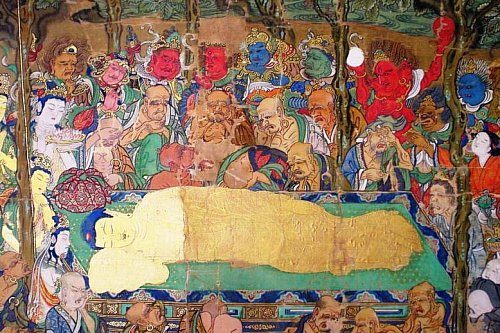
Death of Buddha PaintingAs you may know I have been haunted by the shadow of death the last few months. Trying to understand my feeling of death I wrote these words tonight:
The death of a large star creates a black hole in the sky.
The death of my son, Peter, creates a black hole in my heart.
The daily dying of wars creates a black hole in the USA.
The senseless dying on the streets creates a black hole in lives.
Death and darkness surrounds us, every breathe we take.
Death is unavoidable so we might as well face it head on
And pray we see the light on the other end of the black hole.
Also trying to write more in stories I discovered this story about Buddha and Death that was told my Anthony De Mello S.J., an Indian Jesuit spiritual writer I admire.
Buddha was once threatened with death by a bandit called Angulimal. “Then be good enough to fulfill my dying wish,” said Buddha. “Cut off the branch of that tree.” One slash of the sword, and it was done! “What now?” asked the bandit. Put it back again,” said Buddha. The bandit laughed. “You must be crazy to think anyone can do that.” “On the contrary, it is you who are crazy to think that you are mighty because you can wound and destroy. That is the task of children. The mighty know how to create and heal.”
(From the blog http://www.Spiritual-Short-Stories.com)

Gandhi considered himself,
by choice, as one of the
‘untouchables’ or rejected onesFor some time now I have been interested in the life and work of Mahatma Gandhi, the father of India and inspirational leader of nonviolence. My interest became heighten when I made a Pilgrimage of Peace to India a few years ago with Gandhi followers and recently when my friend made a similar Pilgrimage of Peace in 2011.
The last few days a few things were sent to me by friends, Catholic Worker authors, about Mahatma Gandhi and his failures. One was today in a New York Times Book Review of March 24th in a review called ”How Gandhi became Gandhi”. Is a review of the book “GREAT SOUL, Mahatma Gandhi and His Struggle With India” by Joseph Lelyveld. The book is about how Gandhi’s “evolving sense of his constituency and social vision,” and his subsequent unsuccessful struggle to impose that vision on India. Gandhi is a great hero in India but he failed in getting Indians to follow his ways.
The other insight of Gandhi, his struggles and failures, came from a friend who is writing a book on the assassination of Gandhi and how we can learn from it. He writes: “Again, I think the heart of Gandhian nonviolence is the attitude one takes toward one’s opponent on a crucial issue. Gandhi was astounding in that way —as his (failed) effort, in order to avoid partition, to turn over the Indian government to Jimimah, who was perhaps his most crafty and ruthless opponent.” Gandhi even spoke well of those who eventually were involved in his assassination.
This thoughts on the rejection of Gandhi by his own people come on a day when I feel a little dejected about friends and opponents who I disagree with. If a great person like Gandhi can be rejected and still be positive to all, how can I feel sad about a little rejection. I think I will make Gandhi the patron saint of the ‘rejects’.
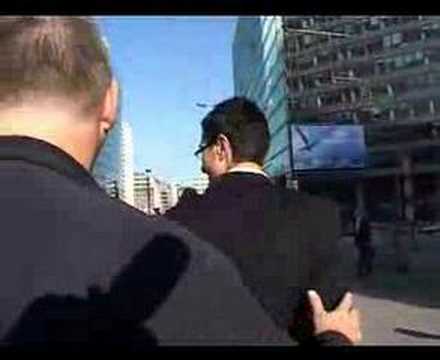
Subsidiarty man is arrestedIn a posting March 15th I asked ‘Is Big Brother Back’? Over the years I have noticed that big government and big business is taking away more and more of the decisions and rights of local government and individuals. It has become very evident in Wisconsin after the Republican take over when now state government wants to dictate every little thing, where a local police or fire fighter can or cannot live, what workers can collective bargain and who cannot, who can vote, what goes on in local schools and health centers, who can purchase a gun.
Over the years I have come across a word “subsidiarty”, which is a word to me representing the opposite of this Big Government/Business movement.
Not many dictionaries have the word listed and, although it is part of Catholic Social teaching it is rarely mentioned in Church, religious education or conversation.
Subsidiarity is an organizing principle that matters ought to be handled by the smallest, lowest or least centralized competent authority. In political terms it means bottom up government and that it is local and regional government that knows best the needs of their citizen. Economically it is part of what is called Distributism which means that the ‘means of production’ should be kept as local as possible. In the words of Chesterton’s: “Too much capitalism does not mean too many capitalists, but too few capitalists.” For Mahatma Gandhi, teacher of nonviolence it was called “Swadeshi”, the use and service of our immediate surroundings over those more remote or foreign.
In Europe the word is used often in the European Union documents but its meaning is kept away from persons as it is here in the USA. But in Europe there is a man, Richard Medic, who by day is a mild mannered spokesman for the Assembly of European Regions, but whose alter-ego has been making the news. As Subsidiarity Man, he has founded a movement to have the word subsidiarity included in all the world’s dictionaries. The slogan of the movement is, “Subsidiarity is a word”. You can watch video’s about the adventures of Subsidiarty Man and the “Subsidiarty is a word” campaign at Subsidiarty man arrested for a word” and Subsidiarity Man jumps from bridge to set world record!.
The spell checker on Microsoft Word does not recognize the word subsidiarty but ‘subsidiarty is a word’ and more dangerously a movement whose time has come.
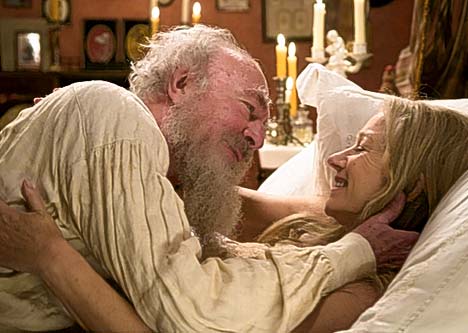
Tolstoy and wife in
“The Last Station”St. Ignatius of Loyola is known for the ‘discernment of spirits’ in his life and his work, especially the Spiritual Exercise. The discernment of spirits for St. Ignatius was his way of learning God’s will and was dependent a lot of feelings. He learned how to reflect how an experience or thoughts left him down and discouraged or with a deep sense of peace and energy, as a way to find the satisfaction and peace of doing God’s will.
An example from my life: Last night my wife and I watched a DVD from the library on the last days of the great Russian writer and philosopher Leo Tolstoy. The movie was called the “The Last Station”. It left us feeling satisfied and a sense of gaining some new knowledge. Tonight we watched another DVD from the library called “Duplicity”. It was advertised as a romantic spy movie but left us confused and like we just wasted time.
However, the sad part of this lesson in discernment of movies is that we have done this before. I have learned not to watch movies that do not have at least 3 of 4 stars in overall ratings. The “Last Station” had four stars and “Duplicity” had two and half stars. More important that discernment of spirits is to practice what we learn from it. All people are made to make mistakes. Great persons discern and learn from their mistakes. This discernment of movies hopefully is the last time I will need to learn this lesson…but I probably said that before.

13th-century mummy of
a Peruvian adult female Today my wife, Pat, and I went to see a “Mummies of the World” exhibition at the Milwaukee Public Museum. I was the one that really wanted to go since I remembered being fascinated as a child by the one Mummy at the old museum.
Some of the mummies were naturally mummified by the climate around them and some, like the ones from Egypt, were preserved by human means.
The mummies from Egypt were kept so the body and spirit could exist in the after world. As Christians we believe our bodies will rise to unite with our spirit but in the ancient culture of Egypt they felt they needed to make this happen by preserving the body.
Seeing mummies this afternoon gave my sense of death a lift, believe it or not. However, upon coming home I received the news that the husband of a friend had died today. I did not know him well and just about a week and half ago heard he had broken his hip. When elderly people break hips, I understand, it shortens their life expectancy. But no one thought it would be so short for my friend’s husband. This sad news brought me back to the reality of life, that dying is necessary to live.
Last night’s posting when talking about my experience in El Salvador in the post Oscar Romero Lives. I noticed that in the beginning of my diary notes about my experience in El Salvador, I had written this poem. I repeat it tonight in tribute to my friend’s husband and to the lesson the mummies remind us about life and death.
The descent into Depression
Is full of fear
Of what may be or not be.
The Darkness is deep
Except for the light,
Dim and distance.
Yet we must walk toward it,
Because without the light at the end,
There is nothing.
May Jim rest in peace and all of us find new life in death.
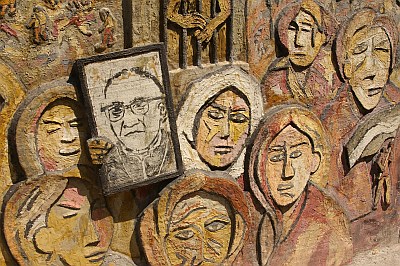
Archbishop Oscar Romero on
wall of martyrs in El SalvadorRecently I sent a friend the essays I wrote after my pilgrimages with Global Awareness through Experience, (GATE), to Latin America. When she went to read about my pilgrimage to El Salvador which I called El Salvador: Land of Barb Wire and Flowers the page had just a picture on it of the tomb in El Salvador of Archbishop Oscar Romero, who was martyred by US trained soldiers 31 years ago today. On the tomb is inscribed his motto as Bishop, “Sentir con la Iglesia”. It is a motto he took from the Spiritual Exercises of St. Ignatius of Loyola which means “to be of one mind with the church.” The church for him was all the people, especially the poor and marginalized of society.
When I was in El Salvador we met with a group of youth who were working in the spirit of Romero to deliver solidarity to a country that had been divided by a tragic civil war between the rich and poor. These youth were not even born when Archbishop Romero died, yet they spoke and were acting in his spirit. I was reminded of one the many great quotes from Archbishop Romero: “Frequently I have been threatened with death. I should tell you that, as a Christian, I don’t believe in death without resurrection. If they kill me, I will be resurrected in the Salvadoran people.” Truly I was experiencing the resurrection of Oscar Romero in these youth.
I could go on with my experiences in El Salvador but I will save them to the day, if every, I finish the story of my pilgrimage. Rather today, the anniversary of his assassination, I rather treat you to a few of his quotes that apply to us today. They are from the The Little Book of Archbishop Oscar Romero. Enjoy, reflect and act for Oscar Romero Lives:
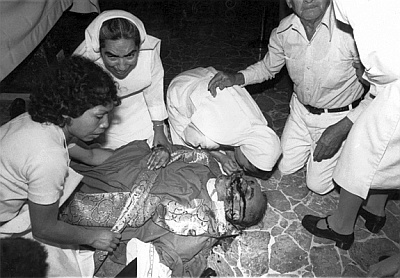
Archbishop Oscar Romero
of El Salvador killed
by U.S. trained soldiers
March 24th, 1980A few of us have been spending an hour of prayer on Wednesdays during Lent praying inside the lobby of Marquette University Library. We are praying for an end to the war in Afghanistan and an end to teaching and supporting the war at Marquette. We have posters with pictures of war victims and quotes from well know persons like Martin Luther King and Dorothy Day
Last year the security guards and police asked us to leave but let us stay. To
]have any type of ‘protest’, that is what they considered our hour of prayer for peace, on the grounds of the school you need permission from the Marquette administration. We have never asked for permission for any of our actions since we know we would be denied.
My role is to hand any willing students, faculty and administrators a flyer. Many say, No Thank You” to my outreach arm and some just ignore us. If someone seems interested I offer them a flyer and say “We are praying for an end to the War in Afghanistan”. If they stop I say we are also praying for an end to Marquette’s support of the war. I then followed it up with the sports slogan We Are Marquette.
Today one of the professors at Marquette, it turned out to be a theology professor, said NO to my offer of a handout in an angry voice. I made some comment like “You do not want to pray with us.” This got him really angry and he starting to yell at me. I backed off but then he complained to the library about us.
One, than two security guards then the Dean of the Library, then Dear if Student Development and his assistant all came up to me and asked us to move on the street. I politely said No to each one but did limit my moving around to hand out flyers.
All this commotion brought more interest of students and persons going by to what we all about. We had a time for some good conversation about how we felt responsible for the killing in the war and why Marquette should not be teaching war and values contrary to the Christian faith it stands for. We even got a few more persons to stand with us.
When I was a community organizer the goal of action we took was to get a response or reaction. It was the response of the authorities on any issue that aided in organizing people. Often our actions at Marquette, just like our letters and request are just ignored. It is hard to organize around being ignored.
In one of the quotes I used is from Elie Wiesel, a survivor of the Holocaust. He said: “The opposite of love is not hate, its indifference. The opposite of art is not ugliness, its indifference. The opposite of faith is not heresy, its indifference. And the opposite of life is not death, its indifference.”
Ears To Hear - Tuesday, March 22, 2011
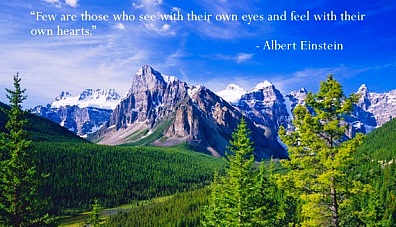
“Few are those who see
with their own eyes and
feel with their own hearts.”
Albert EinsteinToday I took stock of my seeds, what I have and what I need to purchase, for spring planting. Soon I will be outside growing soil and working it to get it ready for the seeds.
In one of Jesus’ parables in the Gospel of Luke he says: “A farmer went out to sow his seed. As he was scattering the seed, some fell along the path; it was trampled on, and the birds ate it up. Some fell on rocky ground, and when it came up, the plants withered because they had no moisture. Other seed fell among thorns, which grew up with it and choked the plants. Still other seed fell on good soil. It came up and yielded a crop, a hundred times more than was sown.” When he said this, he called out, “Whoever has ears to hear, let them hear.” (Luke 8:5–9}
When his disciples asked him what this parable meant. He said, “The knowledge of the secrets of the kingdom of God has been given to you, but to others I speak in parables, so that, ‘though seeing, they may not see; though hearing, they may not understand.’” Then he went on to explain the parable and how the seed is the word of God.
Earlier today I received a picture quote I was reminded of this lesson of really hearing seeing and hearing once more. The quote is from one of the great intellects and scientist of our times, Albert Einstein.. “Few are those who see with their own eyes and feel with their own hearts.”
May we all have eyes to see, ears to hear and hearts to feel.
On this first full day of spring I hear voices for respect and human dignity ring out. I heard on radio today a reporter in Libya talking about how he hears the same cries to be treated with human dignity and respect on the streets there as he heard other Middle East countries.
It is the same cry I heard on the streets around the Capitol in Madison when over 100, 000 of us gathered a week ago last Saturday.
Watching tonight a National Geographic documentary, “Hard Times” on prison life in an Ohio state prison I heard a man say that all he had left was his human dignity and he would do anything, fighting or hustling, to keep it and have it be respected.
Recently I have been kidding around with a friend about his membership in the ‘reject’ club I am making up. He has a serious illness yet thinks he has to work, a regular job for pay, to be a real man. I tell him that is what is holding him back for full membership in the ‘reject’ club.
We all seek human dignity but unless we can find it in ourselves we will always be disappointed. Being a ‘reject’, ‘outcast’ or marginalized is not easy at all. I probably should say that I am a ‘want to be reject’.
Talking about human dignity reminds me of the last civil rights marches of Dr. Martin Luther King Jr. It was in Memphis and it was with the garbage workers of the city who were being treated without human dignity. The signs they marched with said “I am a Man”.
The last year of Dr. King’s life, after his speech ‘breaking the silence’ about the war in Vietnam was spent with him being treated by many in power as an outcast and a reject. It is only fitting that he was killed supporting garbage collectors who were seeking human dignity.
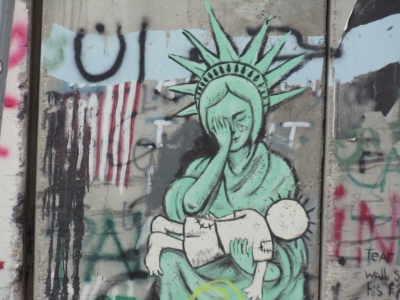
Lady Liberty & HandalaA friend recently wrote me how often a story says much more than many words on the subject. I agree and the last few nights have tried to tell stories in this Diary of the Worm. Tonight I pulled a few stories from emails I have received recently. Hopefully they speak for themselves.
Here is one about C.S. Lewis:
“One day, Lewis and a friend were walking down the road and came upon a street person who reached out to them for help. While his friend kept walking, Lewis stopped and proceeded to empty his wallet. When they resumed their journey, his friend asked, “What are you doing giving him your money like that? Don’t you know he’s just going to squander all that on ale?” Lewis replied, “That’s all I was going to do with it.”
Here is one from someone now in Kabul Afghanistan.
KABUL — Before coming to Afghanistan, I spent a week with students and teachers from a Colorado College nonviolence class who invited me to join them for their retreat near Crestone, Colorado, in an area of the Rocky Mountains described as one of the ten most peaceful places on earth. Coyotes, woodpeckers, and songbirds were easily audible. We reveled in the quiet beauty of an area that is home to 23 spiritual groups, all of whom prize the valley they share as a sacred space.
The area is also home to Canon Air Force Base, Fort Carson and several other military installations. Before leaving Colorado, I visited the U.S. Air Force Academy’s chapel, one of the state’s largest tourist attractions. Pasted on the back of every hymnal in the pews of the Protestant chapel is a prayer that reads, in part, “Make me a channel of your peace that I may defend the skies which canopy free nations.” Ironically, some Coloradans are petitioning the state government to stop the Air Force military flights over their peaceful valleys, and ranchers are likewise insisting that their land shouldn’t be used for combat training. The U.S. military greatly disturbs the fragile ecosystems that are important for ranchers and spiritualists alike.
Finally on the side is a picture taken recently by someone who had a private tour of Bethlehem in Palestine. The character Handala is a cartoon character that appears frequently in Palestine. The artist who created the character says this about Handala:
“Handala was born ten years old, and he will always be ten years old. At that age, I left my homeland, and when he returns, Handala will still be ten, and then he will start growing up. The laws of nature do not apply to him. He is unique. Things will become normal again when the homeland returns.”
The picture on the wall in Bethlehem speaks for itself. Stories say more than words.
In the last few days I received from friends five letters sent from Japan. They are all full of courage in this time of tragedy in Japan. The last one tells three stories gathered from the morning news. The first story is about a middle-aged lady was visiting several shelters in miserable snowy weather looking for her very old mother and finally finds her in a shelter. On leaving the shelter with her mother she apologies to the others in the shelter for her good luck in finding her mother.
The second story is about a lady looking for her husband’s body remains among hundreds of bodies barely covered individually by a blanket. She finds his body intact and says she feels blessed because her husband looked very peaceful.
The third story third story and the letter author’s ending I will quote exactly.
“In another segment of the broadcast, a reporter finds an old lady standing alone in a narrow path formed in the midst of the field of the debris. Being asked what she was doing there, she said, ‘He never used to fail to come home by dinner time but this time. . . You know this is our house. I can tell it by this tree for sure. That’s why I’m here every day, but he hasn’t come back. What happened to him, I wonder.’ Obviously she knows what possibly took place. The landscape has totally changed and she is commuting from the shelter where she stays now. She hasn’t gone out of her mind. She is struggling to stay normal against the harsh reality or totally unreal reality if you will by trying to re-call, literally, an ordinary everyday occurrence. And this may be the only thing she can do and hold herself together … as a mother. When the interviewer gently asks her, ‘Would you wonder if he is possibly missing?’ To this, she wouldn’t say anything, looking into the distant horizon formed by piles of debris. The interviewer offered a possibility of the TV helping her to find the whereabouts of her son or somebody who knows something about him. He invites her to share her son’s name. She positively says,’I do not let you have my son’s name,’ and covers her face with her hands with work gloves on. In a cracking voice, she says, ‘If I mention his name, I’m afraid he, sort of, wouldn’t come back to me anymore.’
After seven days, it is the time of facing the separation and reunion.
Not everybody is as lucky as the prodigal son and/or his father, here.
It was a natural disaster and nobody’s fault. No reason to repent, though many reasons to regret being unable to stay together.
They have no house to return to. Many of them have no family anymore to wait for their return.
To return, you have to have your original place in its original shape, more or less.
It is a story of the prodigal nature, which took all their property away and squandered it.”
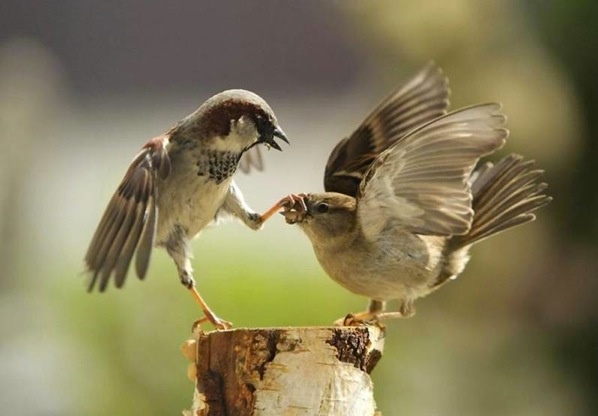
“Stop that chirping” For the first time this year I did a little work outside in the garden. I put some coffee grounds I had leftover from last fall on the worm depository, compost pile that is the winter home for some of the worms. Then I put on the pile some wood chips that I just had gotten today from the city dump.
When I went out to the backyard I could hear but not see the chirping birds that hang out on bushes on the other side of the fence around the garden. As I moved closer to the compost pile the chirping got louder and louder.
Usually I put some bird seeds on the feeder that hangs on the tree over the worm depository. This winter I meant well but did not do it. Sensing my presence they were chirping louder to tell me to get some seeds. I got the message and went to the garage to look for some. To my surprise there was none. Feeling guilty I slid back into the house and the chirping grew softer. At least there was water, but not for my doing, in the bird bath.
I was supposed to meet some nursing students for an interview for a school project today. But I did not schedule it on my phone calendar and set an alarm to remind myself and forgot.
Today our country slid into a third world, this time into oil rich Libya.
Because of the nuclear catastrophe in Japan, the world hardly noticed. The nightly news anchor said there was too much news to report in the world today.
By way of friends I got two letters today from Kabul, Afghanistan about the plight of the people there, especially the youth and children. (See The war is killing Afghanistan’s children. Enough!)
To be honest I feel guiltier about the killing in the three wars we are conducting and about the man-made nuclear accident in Japan than about not feeding the chirping birds in the backyard. However, it is easier to do something about the chirping birds that the wars and the nuclear catastrophe.
Today, St. Patrick’s Day, the first joke I received was about an Irishman reading about his death in the newspaper. In the Irish culture, I understand death is a sad occasion, a traditional wake is seldom solemn. It is full of sharing memories, lots of humor, food and drinking. The Celts and Catholic traditions of Ireland both believe that when a person died they were moving on to a better one in the afterlife and that this was a cause to celebrate.
As I noted before I have felt the last few months that I was walking in the ‘shadow of death’. Although I feel tired and sad about dying there are some benefits to this feeling of death. It certainly inspired me to work harder locally to stop money and training for the killing war brings. In our Pray and Peace hours at Marquette University we have made large pictures of victims of death in Afghanistan trying to make the issue of supporting killing more real and personal to students, faculty and administrators at the Only Jesuit Catholic University to host military training schools for Army, Navy/Marines and Air Force.
This sense of death has also made me more understanding to the suffering and death of peoples all over the world, especially in Iraq, Afghanistan and our own American soldiers. The featured article on this web page is The War is Killing Afghanistan’s Children. Enough!
I have come to understand that living with a sense of death does not automatically mean that one is going to die in the near future, at least I hope so. However, it does make one more sensitive to relationships and apologetic for any harm one might have done.
When one feels like they are dying, following one’s conscience and prioritized actions seem very important. It is harder to live in the present with a sense of death but it is necessary.
When I was in Guatemala, (see Buried in Guatemala) the largest celebration of the year was on Good Friday, the day we remember the death of Jesus. It was bigger than Easter or Christmas.
Maybe the Irish and Guatemalans have something we can learn from in their celebration of death.
What Is Art? - Wednesday, March 16, 2011
A friend sent me a large postcard with this quote on it and four pictures of my deceased son’s artwork below it. Tonight I would like to share the quote, from “Telling Stories” by Joyce Carol Oates. This quote moves me to work on Peter’s art web page. So much of his art is a deep expression of himself, his pain, suffering as well as the meaning of life.
“What is ‘art’ but the effort of giving permanent form-in language, in painting, sculpture, music-to those elemental forces in our lives, those passions, hurts, triumphs, and mysteries that have no permanence otherwise. Our lives, especially at their happiest moments, fly past as quickly as a mountain stream rushing along its rocky course, throwing up frothy, sparkling spray. The effort of art is to slow the rapid motion, to bring it to a halt so that it can be seen, known. All artists know either consciously or instinctively that the secret intention of their life’s work is to rescue from the plunge of time something of beauty, permanence and significance in another’s eyes.“
With all that is happening in government and politics today I believe that the ’Big Brother’ of the George Orwell novel of Nineteen Eighty-Four may be back. As evidence I offer the following:
1) Have you noticed there are cameras everywhere, on streets, stores and houses watching all our moves?
2) Big government is taking away control from smaller government units. For example, in the new proposed Wisconsin budget the decision if city employees like police and firemen need to live in city they serve is being decided by the State.
3) We are powerless to tax ourselves for the common good. A referendum for a new tax for transportation was approved by great majority of county residents only to be told No by State Legislatures.
4) In the budget a new ‘health czar’, appointed by the Governor, will have authority to make decisions on health matters that were reserved to legislature.
5) Control of quality of education is being taken away from local governments by the State.
6) A bill that protects agricultural land from developers is being repealed in the new budget.
7) The very people that are concerned about the great Federal Debt continue tax breaks for the rich and cut services for persons in need.
8) More and more money goes to war and weapon manufacturers no matter what people want.
9) People are kept in fear more and more. It used to be the ‘communist’ not it is the ‘terrorist.’
10) Major media is controlled by a few and heavily censored.
11) Our personal information is lifted from us and used by big businesses and government.
12) People feel powerless to make social change and when they try are ‘ignored’ by the ‘powers that be.’
13) We teach war in Catholic universities that preach against war.
I could go on and on with examples as many of you can. Is Big Brother Back?
In Loaves and Fishes Part 1 I told one story I learned at Tabgha, where it is said Jesus multiplied five loaves and two fish to feed 5000 plus persons. (Mark 6:30-46) The story was about why there are only four not five loaves of bread in the mosaic that was discovered carved into the floor of the Church.
Tonight I will tell the story that is told why there were “twelve full baskets of the broken pieces, and also of the fish” after “all ate and were satisfied”. I could not understand why Jesus left so many leftovers to his miracle. It seemed like a waste.
The story us told us at Tabgha and written in stone on the walls of tablets outside the church goes something like this. In the time of Jesus traveling was done on foot and on dusty dirt roads. There were no roadside stops on the roads. So when people traveled a distance from home they carried around their neck a leather pouch with dried fish and bread as a precautionary measure.
When the large crowd that had followed Jesus to this ‘desolate place’ Jesus’ apostles told him it was late and to send them home or to nearby villages.
When Jesus told them to feed the people there all the apostles could come up with his five loaves of bread and two fish. Jesus blessed the food and told his apostles to distribute them among the people. The five loaves and two fish were enough to feed everyone.
The story goes that when the people saw Jesus and his apostles sharing what little they had with them they opened their leather bags and served the bread and fish they had brought for the road. Seeing Jesus and his disciples share their bread they did likewise. Thus, the 12 baskets of leftovers.
The quote and drawing on the left are from Don Richards, the husband of Dee Richards who shared his and her love with us all at her memorial liturgy, “breaking of the bread” yesterday. “Love is a basket with five loaves and two fish.”
At a friend’s memorial mass today the Gospel reading was the story of the miracle of the Multiplication of Loaves and Fishes, where Jesus is said to have taken five loaves of bread and two fish and fed over 5000 persons. (Mark 6: 30-46)
This scripture reading reminded me of my visit to Tabgha, an area situated on the north-western shore of the Sea of Galilee in Israel. The site is said to have been discovered by St. Helene, the mother of the mother of the Roman Emperor Constantine. It was discovered in the 19th Century that the early Christians had carved into the floor of the original building a beautiful mosaic of loaves and fishes.
Although the Gospel story clearly states there were five loaves of bread and two fishes that Jesus multiplied to feed the masses the mosaic has only four loaves of bread and two fishes in it. When our Palestinian guide was asked about this he replied with a story.
The story is that the early followers of the way of Jesus, early Christians, left out the fifth loaf since they felt that they were the fifth loaf. They were carrying it in themselves and their job was to go out with the bread and multiply it by sharing it with others. In today’s homily on this Gospel, my friend, the husband of the deceased, reflected on this story of how we can spread love by sharing what we have, our loaves and fishes, with others in need.
Now this story made sense but did not answer the burning question why there were so many baskets of leftover bread and fish after ever one’s need for food was satisfied? It did not make sense that Jesus would make more than was needed. On the walls surrounding the site there is a story that answers this question about the leftovers of the loaves and fishes. That story, why so much leftovers, is coming tomorrow night,
Last Wednesday I wrote how We are Marquette, how all of us are responsible for the war and killing that Marquette trains men and woman to do in war. Today I went with a grandson, his cousin and my daughter-in-law to Madison to join the largest crowd, over 100,000, to gather to protest the Governor and Republican legislatures forcing changes in our state government that the majority of people do not want. As I was bordering the shuttle bus from the parking lot to the capitol a woman handed me a sign that said “We Are Wisconsin.” There were many signs at the protest at the Capitol, some funny and some serious, but this one held a special meaning. For as We are Marquette, we are Wisconsin. One of the chants of the crowd said it all: “This is what democracy looks like.”
I have been drinking a lot of coffee during the day recently to keep my mind focused. Today on the drive there and back and all the time we were in Madison my tiredness disappeared. I felt normal, not high on the energy and excitement of the crowd but not tired and need of caffeine.
This struggle to exert the needs and rights of the people of Wisconsin, the poor, the workers and the middle class over the greedy riches of the rich is a struggle that is going on across the country. America were always known as the country of equality and opportunity. Now that countries around the world are struggling to be like the USA in freedom and rights we are struggling to maintain our status. We must stand up and be counted for our rights because “We are Wisconsin”.
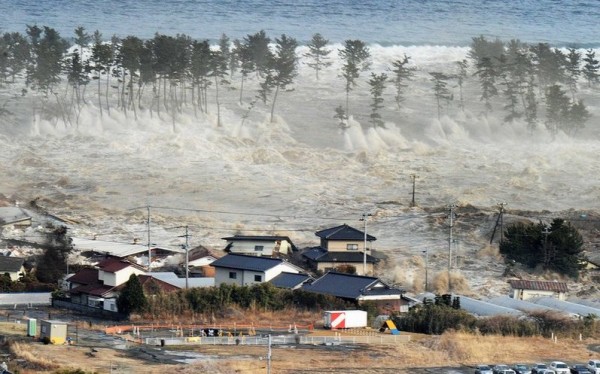
Earthquake & tsaunami
in JapanToday many words were spoken about the tragic earthquake and tsunami in Japan. However the pictures coming from Japan are more powerful than any words. We know a lot about nature but could not predict this event and its magnitude. There is a certain unpredictability built in nature that will probably last for a long time, perhaps till the end of the world.
Like words nature can be beautiful and ugly. Like words nature can be provocative and sensual.
Recently I have been receiving beautiful nature pictures with powerful quotes. It is said that one picture speaks a thousand words. So today I started a new web page called Pictures and Quotes. The combination of the beauty of nature with a thoughtful quote brings together the best of nature and words. See the beginning of this union of nature and words here.
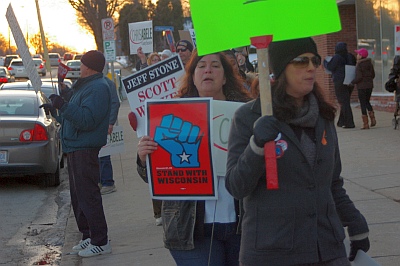
Protest TodayI was on the streets twice today, once this morning to pray with MICAH Holy Ground Prayer Vigils at the site of homicide victims, four deaths remembered this morning. The second time was in a nearby suburb to protest one of the Republican assembly persons who voted against collective bargaining for state workers today. The first one was quiet and prayerful with people praying as they may and afterward hugs for the family of the victims. The political protest was orderly but noisy with signs, chants and marching.
Prayer and protest both work. In prayer we put ourselves in the hands of God, his mercy and power. In protest, we take a nonviolent stand for what we believe, today for the collective bargaining rights of state workers.
Yesterday at Marquette we combined protest and prayer as we stood together in the Marquette University Library lobby to pray for and protest Marquette’s participation in the killing of the war in Afghanistan as we stood and said We Are Marquette.
In prayer and protest God is neither a Republican nor Democrat, although political parties and prayer groups do try to make God on their side. As Jim Wallis of Sojourners magazine says there is God’s Politics which is about “seeking God’s will on earth as it is in heaven
In political battles, like we are now experiencing in Wisconsin, Republicans say this is what voters voted for and the Democrats say vote the Republicans out. Both parties seek power. In God’s politics, which is neither Republican nor Democrat the nonviolent struggle for justice for all prevails; prayer and protest are aligned and seek the same thing.
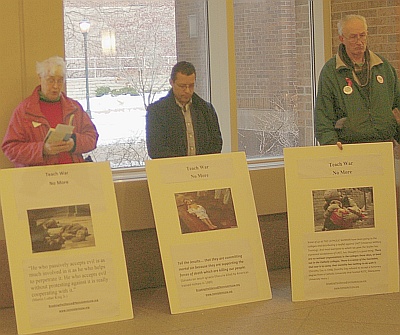
We Are MarquetteA small group of us gathered at 4pm in the lobby of the Marquette University Library to spend an hour praying for the end to the war in Afghanistan and Marquette’s support of the war. My role was to pass out Pray and Fast flyers to people entering or leaving the library. As I did I would say that we are praying for an end of the war and an end to Marquette’s support of the war. If I had enough time I would add: “We Are Marquette”, the cry of the crowd at sports events.
With our posters, flyers and banners we were trying to communicate this simple message that just like we say ‘We are Marquette’, we are responsible for the killing in Afghanistan.
Tonight I featured on this web site the article “The War is Killing Afghanistan’s Children. Enough!”. We are the NATO/ISAF armed forces that are targeting Afghan children. We are also the Afghan Children being killed.
Early this evening the State Senator Republicans voted, probably illegally, to strip State Workers of collective bargaining rights. Up to this point they said they needed to do this as part of a budget bill to protect the people of Wisconsin. When the people of Wisconsin did not agree they stripped it out of the budget bill and passed it in the Senate with eighteen Republicans voting yes and one no as the Democratic Senators are still out of state. People all over the State are rising up tonight and saying we are the people and you cannot walk over us like that.
I saw my local alderman on TV tonight blasting the same State Republicans who yesterday voted to strip away the power of local governments like Milwaukee to have residence requirements for police and fire officers. The very same people who are decrying big government are not imposing big government on local governments with this bill and others like eliminating collective bargaining on local level.
We were a small voice crying out in our silent prayer today that we are responsible for the killing in Afghanistan, especially of children and need to stop it. Workers and middle class are crying out to the out of control State government to stop taking away our local control and rights. Yes, the children of Afghanistan, the State Works. We are Marquette.
More Pictures Below:
War at Home - Tuesday, March 08, 2011
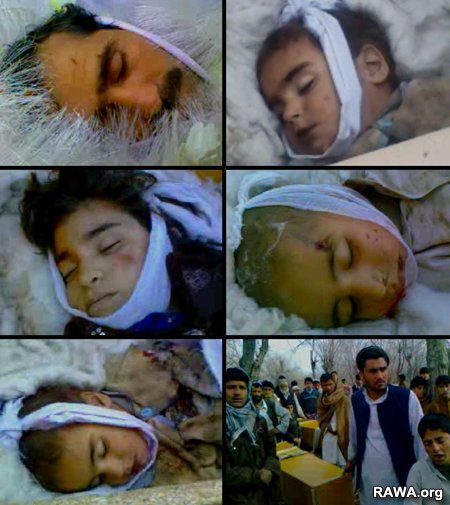
War Victims In AfghanistanTomorrow,Ash Wednesday, a few of us will start an hour of Praying and Fasting weekly. Our prayer and fast is a type of penance for the killing our country, we, support in Afghanistan. We will be fighting the war at home.
Today an article in Common Dreams said it very clearly: “The War is Killing Afghanistan’s Children. Enough!”. The war in Afghanistan will stop when the American people refuse to pay for the killing and refuse to kill or be killed in Afghanistan.
Military training, such as Marquette University, where we will be tomorrow teaches men and woman to ”put aside their morality” in order to kill without conscience. The military makes all Afghans the ‘enemy’ that will kill you if you do not first kill them.
Marquette University and all of us need to realize we are killing real people Afghans, Iraqi and Americans by our support of the war by our money or by our support of military training to “kill or be killed” at our schools.
Once the war becomes personal killing, not killing ‘terrorist’ but persons, even innocent children with names, the war will end. The other day the Joints Chiefs of Staff when talking about American hesitation to enact a ‘no fly zone’ in Libya, which would result in bombing Libya said “Violence begets Violence.” I say yes and to stop the war in Afghanistan we must nonviolently fight the “War at Home”.

Julian of NorwichAs we were purchasing burial niches for our son and ourselves,, my wife and I were talking about epitaphs. What kept coming to my mind was a phrase “All shall be well.” The phrase comes from a 14th century English mystic Julian of Norwich.
According to Julian, God is both our mother and our father. The saying, “…All shall be well, and all shall be well, and all manner of things shall be well”, which Julian claimed to be said to her by God, reflects her theology. Although Julian lived in a time of turmoil, including the Black Death plague, her theology was optimistic, speaking of God’s love in terms of joy and compassion as opposed to law and duty.
I felt today more energized. I may finally be emerging from this feeling of walking in the shadow of death that encompassed me. As I slowing come back to life I feel the experience of the loss of my son and the pain of death have helped me be a more ‘gentle and kinder’ person, something I have prayed for. At least I hope so.
When we view life from our death it takes on a new perspective. The bigger picture of life can be seen and petty things disappear. Even sin and evil seem part of the plan for our Mother and Father, God. We can begin to say: “All shall be well, and all shall be well, and all manner of things shall be well”
Lady Wisdom - Sunday, March 06, 2011
Saturday evening we were at dinner with some friends and I was sitting next to a 20 year old son of a friend. Between dinner and moments of conversation he would sneak a peek at a book open on his lap. I asked him what he was reading and he said it was a book of poetry from various poets. I know he writes poetry himself and his artist. When we were speaking about poetry I mentioned that in my younger days I considered myself a poet. I do not know if he believed me or not since these days I rarely write poetry.
Looking for something else on the computer I discover this poetic writing I had written in the 90’s in a class on Wisdom literature in the Bible.
I wrote this poem at a dark time in my life, during Lent, which is coming around this week on Wednesday. I found parts of the poem helpful to me in these days so I share:
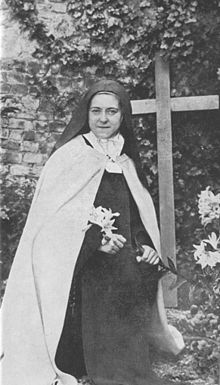
Thérèse in July 1896With some advice from a friend and finding a store with the right part, I was able today to fix a leaky faucet in the bathroom. This ordinary home improvement job was a small part of my day but came with a sense of accomplishment for me. That was because I looked at this small job as something big for me to do.
All small tasks can become great accomplishments if we view them as something important. Dorothy Day, co-founder of the Catholic Worker, called it ‘the little way’. “Paper work, cleaning the house, dealing with the innumerable visitors who come all through the day, answering the phone, keeping patience and acting intelligently, which is to find some meaning in all that happens — these things, too, are the works of peace, and often seem like a very little way.” (Dorothy Day, On Pilgrimage, December, 1965)
She admired St. Therese of Lisieux, the Little Flower. St. Therese lived a hidden life as cloistered Carmelite religious. She died when she was only 24, having lived her life in the convent, doing ordinary chores, since she was 15. It was only after her death and the publication of her memoirs that persons realized the depth of love she did ordinary things each day. She wrote in her autobiography: “Love proves itself by deeds, so how am I to show my love? Great deeds are forbidden me. The only way I can prove my love is by scattering flowers and these flowers are every little sacrifice, every glance and word, and the doing of the least actions for love.”
Dorothy Day sought and found great joy in the everyday chores of a house of hospitality, like doing dishes and preparing meals.
I have noticed during the last week a number of persons greeting me on the streets like they knew me. Milwaukee is friendly city where everyone seems to know everyone but these ordinary greetings were extraordinary for me. Maybe it was not the greetings that were special but the way I viewed them.
Ordinary things can be extraordinary when we live ‘the little way’.
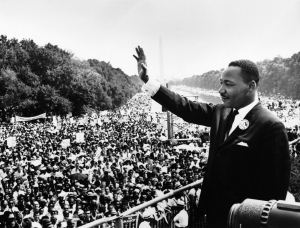
“To produce change, people
must be organized to work
together in units of power.”
Martin Luther King Jr.Many of my friends are working against the denial of rights of the people of Wisconsin, for State workers to have collective bargaining, for taxpayers to decide to how to spend tax dollars, the right of taxpayers to raise taxes for better city services, right to decent education and health system. On the cry of “Cut taxes” the Governor and his supports have given tax cuts to rich and taken the money from the poor and middle class.
How my friends work on this issue varies. Some works on recalls of politicians, sign petitions, register more people to vote. Others organize protest, acts of civil disobedience in Madison and in communities around the state and use the internet to spread information and organize.
In my opinion it is better to organize than to vote. Votes can be influenced and purchased by big money. Actions cannot. Petitions can be ignored and but sit in’s at the State Capitol cannot. Big money can control information on the media but not on the internet.
All significant social change comes through organizing, nonviolent action and civil disobedience. In a truly democratic society where there is taxation with representation voting makes sense. In what is called democratic government in USA and Wisconsin where big money and business control politics organizing is needed for change.
President Obama and other leaders who run on an agenda for change say “If we’re not willing to take up that fight, then real change—change that will make a lasting difference in the lives of ordinary Americans—will keep getting blocked by the defenders of the status quo. “ Taking up the fight to me means going on the offensive, organizing, taking mass action, voting with our feet.
A president, governor or any other politicians cannot make a change for good or bad, in our might, if we stay and work together, organize and take action. The struggle is on in Wisconsin. Do we organize or vote?
Near the end of every winter I seek the coming of spring. And every year the death and darkness of winter gives way to the life and light of spring. March 3rd might be a little early for this strong desire for spring but I have it now.
The death of my son at the end of last summer, the cold, snow and harshness of this winter and the suffering of friends and family probably all contributed to this long winter. I remembered the faith saying that we must die to live, suffer and struggle for joy and peace. As usual a quote came my way today that captured this reality in the light of Growing Power:
“If we don’t change, we don’t grow. If we don’t grow, we are not really living. Growth demands a temporary surrender of security.” (Gail Sheehy)
I guess that is the way it is in Nature, one must die to live, and the seed is planted in the ground to grow. The hard part, however, about this way of growing and really living is the “temporary surrender of security.”
The ground hog said spring would be early this year. Let’s hope it was right and our waiting for spring is short.
Enough already! We did not want to come up from our safe and secure ground deep down in the compost pile, but we must speak out. This is the Diary of the Worm. We worms believe in the “Laws of Nature”.
We worms have been around for about 120 million years and have seen species, including the dinosaurs, come and go. Although weak, vulnerable, and with the smallest brain (if you can even call it that), we survive because we are adaptable and, although there are thousands of species of worms, we all get along. We literally renew the earth by enriching and aerating the soil and as Charles Darwin discovered, turning over the top six inches (15 cm) of topsoil every 20 years.
I say the above not to brag (what can worms brag about except maybe our castings?), but to put in our worm bit about what is happening in Wisconsin and how the “Laws of Nature” are being broken.
You governor, after his election with some support, turned down “green” jobs that would have built a high speed rail system and would have saved energy and been an economic boon to the state. In his first month in office he gave away 141 million dollars of your tax money over the next two years to rich businesses by way of tax cuts. Now under the pretense of savings he is trying to take away the collective bargaining rights of workers. However, the final blow that got me to rise up out of the compost came yesterday when he announced his proposed budget.
We worms have seen many harsh rulers over the last 120 million years, but are shocked to see one in Wisconsin that dictates what taxes you can pay or where they can go; that is going to slash education, which you call a valuable resource, so severely; proposes to cut health and financial care to the most vulnerable in society — the poor and ill. The final blow affecting all creatures on earth, even worms, was his elimination of the recycling mandate. You humans have wrecked our earth enough; now to eliminate recycling is a blow to nature that will come back and haunt you, as will these other travesties of justice and common sense.
We know that some of you elected this Governor, and there are others who follow him. But certainly this does not mean you must take it lying down and crawling around like us. You humans have big brains, voices, and legs to march on, and have the ability to organize and strike out nonviolently. For the sake of the Nature and earth we weak worms plead with you: Remember your Declaration of Independence where the “Laws of Nature” get priority. Working together, as we do, you can do it.
“It’s not the load that breaks you down, it’s the way you carry it.” - Lena Horne.
Last Sunday night at the Academy Awards Celebration a special tribute was paid to Lena Horne. Although she was the first African American woman to sign a contract with a major Hollywood production company she suffered many burdens in her personal and professional life.
This quote came in my life at the right moment. I have been tired of being tired recently and have complained much about it. I was talking with an old friend today about how tired I am and later he came across this quote and sent it to me.
The quote being on beautiful nature photography made it even better. Another friend who recently made the Pilgrimage of Peace 2011 has being sharing Gandhi quotes on beautiful nature pictures he receives daily from a bookstore in Mumbai, India. These ‘thoughts’ of Gandhi are also deeply enhanced by the beauty of nature.
I have some web pages on www.nonviolentcow of quotes from , Gandhi, Dorothy Day, Martin Luther King and Various Quotes. Now I need one for Quotes and Nature Pictures.
There are a few of the Gandhi quotes and Pictures below: